Having fulfilled that dream, I no longer had a strong desire to go anywhere/see anything in particular.
During the last several semesters of my undergraduate education at BYU (political science), including my capstone course, I emphasized in humanitarian intervention. You cannot take a course on intervention without studying the Rwandan genocide in depth. Studying the different cases of genocide throughout the world and especially the genocide in Rwanda changed my views on life, foreign affairs/policy forever. Many people get frustrated when I talk with them about politics, and with good reason. I often argue many sides and seldom take a strong position on any issue. The topic of the genocide in Rwanda is a huge exception for.
The short of it is, in 1994, the international committee (the whole world) figuratively spat in the face the people of Rwanda. We watched as the Hutu-controlled Rwandan government planned and carried out the killing of 800,000-1,000,000 of its people. This mass killing took only 100 days. Most of these people (men, women, and children) died in horrific ways hacked to death with machetes.
What's more, we had the ability to stop the genocide many times and yet we watched as this happened.
Some people try to defend The West (and the whole world) for how they handled the situation in Rwanda saying things like "it was a messy civil war that was none of our concern" or "intervening would have breached the sovereignty of Rwanda and we cannot do that." Both of those statements have varying levels of truth but they are pitiful excuses in my opinion.
In 1948, having witnessed the horrific results of the Nazi Holocaust, during the UN General Assembly, the nations of the world declared in The Universal Declaration of Human Rights that we would "Never Again" tolerate genocide.
With that in mind, going back to the topic of the Rwandan genocide in 1994, I like to ask the question, what would happen if we found out that men, women, and children in France, or England, or any European country, were being raped, tortured, and hacked to death by the hundreds of thousands? We would intervene in a heart beat. What if the same were happening in an oil-rich country or in a country where we have an economic interest or geo-political interest? Of course we would intervene.
What does that say about the value of life or how we determine whose lives we value? What message does it send the Rwandan/African people when they look at our track record of intervention. We are basically telling them.... "You don't matter." If your country had a resource that we cared about, or if there were a strategic advantage to be gained, we would be more than happy to intervene in your behalf. But the lives of 1,000,000 men, women, and children (killed in only 100 days by the way, that's an average of 10,000 people every day) is not a valued resource to us.... again... you don't matter."
Long story short, I am pretty passionate about this subject and would be more than happy to discuss it with anyone who is interested. Maybe I have missed something in my studies on the subject and am short sighted on some points. But until I discover those points, I cannot help but feel extremely passionate that the whole world completely let down the innocent victims in Rwanda. (not to mention the many other horrible events of recent years where our brothers and sisters needed our help and we did nothing...) Okay... I'll get off my soap box now.
The Trip
A few months ago, after deciding I would go to Uganda this summer, I realized how close Uganda was to Rwanda and I knew I wanted to go there and see the genocide sites for myself. I did not know what to expect and in many ways, it was not what I expected.
Rwanda (which means "Land of 1,000 Hills" is made up of 1,000 hills. It is beautiful. Cities, towns, and villages are all built on these rolling green hills.
Very few people speak English in Rwanda (unlike Uganda) so it was interesting trying to get around and communicate with people. It led to some adventures and fortunately, I got lost a few times (I'll show later why I say "fortunately")
25 July 2012
On 24 July, I had a friend from Kampla buy me a ticket on the Jaguar bus to Kigali. The next morning, I left at 5:30 am to get to Kampala for the 9:00am bus.
This is a picture of the bus gassing up about half way from Kampala, Uganda to Kigali, Rwanda.
From a different view (still in Uganda). Note to anyone thinking of taking this trip. DO NOT BUY A SEAT IN THE BACK OF THE BUS. It really was comical how continuously bumpy the ride was. My bum really left the seat at least 10 times and I was in a constant state of shaking. But it was an adventure.
At the border, you have to get out and sign exit papers on the Uganda side, then walk about a half mile through "no man's land" (a stretch of land that is neither Uganda nor Rwanda). Here, I am crossing the bridge to get to Rwanda where I filled out Rwanda entry papers, exchanged some money on the black market for Rwandan Francs, and get my Rwandan visa. Interestingly enough, my baggage was searched at the border and the border officers confiscated my plastic bags (plastic bags are against the law in Rwanda). We then filed on the bus and continued our journey to Kigali.
26 July 2012
This is the outside of the hostel where I stayed three nights. One of the most memorable/meaningful parts of this trip was spending time with other people in the hostel. People staying there were from all over Europe, USA, and Africa. One of the most fun things about going on trips alone is building a network of friends whom you can help and who can help you while you are away from everything.
On Thursday 26 July, I wandered the city looking for a map. After finding a map and eating lunch at a local "buffet", I had a motorcycle taxi take me to the Kigali Genocide Memorial Centre. After 1994, this site was primarily a mass grave that where they have since built a museum dedicated to the 1994 genocide with exhibits also describing other genocides of the last 100 years.
I ran into these kids on my way to the memorial/museum (the gates of which are right behind the children).
Joseph Stalin (one of the world's greatest champions of killing his own people) once said "One death is a tragedy, a million is a statistic." It is very easy to dismiss thoughts of a million people killed because it just seems like a number, not something you can have an emotional attachment to. It is important to look at this in terms of individuals and not just big numbers. I appreciated how this museum focused on individual people's stories as well as the events as a whole. This exhibit highlights pictures of some of the victims. Just normal people who were hunted and chopped to death.
Pictures of normal people. Each one important. Pictures of weddings, first days of school, families, children playing, etc.
Many of the skulls/bones I saw had bullet holes, gashes from machetes, cracks from blunt objects.
Some of the victims' clothes
Children's Exhibit
I thought this exhibit did a very good job putting a face to the victims of the genocide.
Ariane (above left) "Stabbed in her eyes and head"
David (above right) "Tortured to death"
"UNAMIR will come for us" For those of you who are not familiar with UNAMIR, it is the United Nations Assistance Mission for Rwanda. UNAMIR set up positions in many places throughout Rwanda. People fled to these "safe havens" and one after another, UNAMIR troops evacuated. The Hutu militias walked right in to the "safe havens" on the heals of the UN's withdrawal hacking to death tens of thousands of Tutsis at a time. UNAMIR and the international community failed to protect.
Having grown up in the U.S.A. all my life, it is difficult to imagine what life would be like if my government not only failed to protect me, but if it was targeting me. Who would I turn to? Assuming it was not in my power to protect myself, I would hope that other countries of the world would save me and my family from mass rape, torture, and murder that was inevitable without their help.
If I remember correctly, one of these children was shot in the head and the other killed by machete.
"Hacked by machete at grandmother's house"
"Killed by machete at Nyamata church" (On 27 July, I took a short trip to Nyamata church. See below)
After a couple hours in the museum, I went outside to the grounds where the mass graves are located. Like the sign says, there are over 250,000 people buried in the graves just down these steps. (only 1/4 of those killed in the 100-day genocide.
Long-stretching mass grave.
This is a view from the memorial. The main downtown area of Kigali is on the hill in the distance.
Later that evening
It started getting dark so I tried to tell a motorcycle taxi driver to take me to the craft market. After driving up and down the hills of Kigali, we arrived at some place and he stopped the motorcycle, I asked if it was the craft market and he pointed to a building a few hundred feet away. I gave him the money for the ride and walked to the "craft market" which turned out to be just a food store with basic groceries. Making the most of the situation, I bought some bread and yogurt for dinner and sat down to eat it. Outside in the dark I could hear some drums and singing. I followed the sound and came upon a nearby building where a dance group was doing a rehearsal for an upcoming wedding where they were to perform. They let me inside and I spent the next 2 hours watching, photographing, filming and attempting to communicate. I had a great time. They are very fun people.
I had a really fun time with the drum/choir/dance group. At the end of the rehearsal, they invited me in a big circle where people held hands and they sang a song and prayed. It was kind of a cool experience. I took motorcycle taxi back to the part of town where my hostel was located. Not wanting to go to bed just yet, I found a sports bar in a nearby hotel where they were showing some Olympic football (soccer) games. I ordered a hotdog (I was a bit scared but it turned out okay) and watched soccer till 12:30 and then went to bed.
27 July 2012
I set off early (unlike the day before when I spent half of the day just talking with expats at the hostel) to try and see as many things as I could. My first stop was the taxi park/bus park where I bought a ticket to Nyamata.
Lookin good. After my "hair cut" a girl in a side room washed my scalp (and my ears, wet willie style), gave me a scalp massage, and cleaned out my ears with Q tips. It was quite the pampering experience.
A view from the barber shop at the taxi/bus park.
Here's me crammed in the taxi van headed to Nyamata and Ntarama to see the churches in those villages, both of which were sites where thousands of citizens were killed.
This is just a photo taken from the window of the taxi. Leaving Kigali.
More photos taken from the taxi. Rolling hills of Rwanda.
Another picture taken from the taxi. The Nyaborongo River on the way to Nyamata/Ntarama. During the genocide, many people hid along the banks of this river trying to escape the militia. Many other people were drowned in the river. Many bodies were dumped into this river. They made there way to Lake Victoria and into Uganda.
I have talked with Ugandans about what life was like in 1994. They say that they did not eat fish during that time because those fish were feeding on bodies floating north from the genocide. The Ugandan government eventually created dams to keep all of the bodies from coming into Uganda.
I got out of the taxi and found a motorcycle taxi who would take me to Ntarama. A village with one of the churches that I wanted to visit. As you can see. I'm wearing a helmet. Motorcycle taxis in Rwanda are required to give you a helmet to wear. What's more, they are only allowed to have one passenger at a time.
Ntarama Church
In 1959, Rwanda had a revolution where Hutus killed Tutsis. Many people gathered at churches and the Hutus did not harm them there. In 1994, Tutsis, hoping that the churches would again act as a safe haven, gathered in churches. In Ntarama, around 5,000 people (equivalent to the entire population of my home town in Holbrook Arizona) gathered at the church to escape the Hutu militia. The Hutus murdered them all with brutality.
Me at the front gate.
Walking up to the church. It was eerie being the only one tourist there. The only other people there were the guard and the curator. Inside these grounds, Hutus murdered 5,000 people.
The main entrance to the church. I had the guard stand in for a picture.
As you walk in the front door, you see shelves with skulls/bones. Like most of the skulls at these genocide sites. There are often signs of machete cracks and other damage.
The back side of the church. Hutus blew through the walls with grenades and then threw grenades inside. Inside the church, the victims' clothes line the pews and are hanging from the rafters.
This was one of the saddest parts of the Ntarama church. The curator lady explained to me that this was the Sunday school. Many of the children were killed here, their bodies smashed against that wall to finish them off. The blood stain remains. I couldn't help but wonder what it must have felt like to be in this church, to know that evil people are going to kill you and no one is going to stop them. Your government is sponsoring them and the rest of the world is letting it happen.
This is the kitchen. The Hutus burned the people in the kitchen inside.
Another structure where people were hiding.
After a humbling experience at Nyamata church, I got back on the motorcycle and went to the church memorial in Nyamata.
A view from over the top of the motorcycle driver's head on the road from Ntarama to Nyamata.
The outside of Nyamata church. 10,000 people gathered at this church. The Hutu killers murdered them in a way similar to that of Ntarama.
This is an undergrownd crypt in the back of the church. Inside, you find stacks of shelves holding bones, skulls, and caskets
The crypts behind the church. In the distance is a guy I spent the rest of the afternoon with. Adam Jones is a political science professor who teaches courses on genocide similar to the courses I took during my undergrad degree at BYU. It was cool to have a professor around to talk with and discuss the genocide here.
"Never Again Genocide"
They have adopted these words from the 1948 Universal Declaration Human Rights. A part of me is sad that they use these words given how many genocides have occurred since then and given how preventable/solvable the genocide in Rwanda was. It's too bad that our de facto motto is "Never again, as long as it's in our interests"
May we honor our words "Never Again" as a promise that we live up to. May we do all we can to not let it be just an empty phrase on bouquets that line mass graves.
To innocent victims of genocides, current/past/future. May our words and actions prove our declaration that
you matter.
On the way back to Kigali from Nyamata/Ntarama churches, we passed by this technical school which used to be called Ecole Technique Officielle. During the genocide, this was a UN base where 2,000 Rwandans went for safe haven. The UN later evacuated leaving 2,000 civilians without protection. Like so many other cases during the genocide, the Hutu killers entered the "safe haven" after the UN left and ruthlessly killed/raped/tortured thousands of innocent civilians.
The Mille Collines Hotel "Hotel Rwanda"
Back in Uganda, before coming to Rwanda, I read Paul Rusesabagina's autobiography, An Ordinary Man. In it, Mr. Rusesabagina (who once was the manager of the Hotel Mille Collines) gives a brief history behind the genocide in Rwanda, he then describes how the genocide played out in Kigali. Rusesabagina used his connections to keep more than 1,200 people safe in the hotel while hundreds of thousands were being slaughtered outside its gates.
The Hotel Mille Collines "Hotel Rwanda"
A view from the patio
When the Hutu militia cut the water, they used the pool to ration drinking/bathing water.
The entrance/lobby.
After spending some time at the Mille Collines, looking around, talking with employees, and chatting with some British friends that I met the day before at the hostel (Freddie and Jamal, film students at Oxford), I went to a nearby market and bought some bread and yogurt. I started talking with this guy (Edward) who hadn't eaten in a while so we ate bread and peanuts and talked about Rwanda and its history.
Rugby
After saying goodbye to Edward, I caught another motorcycle taxi to the craft market. After looking around a bit, I left and saw a group of young guys playing rugby in a nearby field. I went and watched them play a bit and then the coach introduced himself to me. Leon is his name. He is a player on the Rwanda national team. He and several of the players taught me the rules and we all hung out for a while before parting ways. I finished the night at the sports bar from the night before watching the Olympic Games opening ceremony.
The fellas, rugby into the night.
Playing "touch" rugby in the field
Leon (coach/player on the Rwandan national team) and Lane (Just a good lookin dude who is interested in playing rugby)
Lane and the fellas who helped teach him how to play. From left to right, Lane, Leon, Deedee, Manna (from New Zeland, and Liam (from Australia). I really wish I could have stayed in Rwanda more than a couple days. It would have been fun to spend more time with these guys and play with them.
One of the best parts about traveling by yourself is the freedom to make new friends everywhere you go and spend as much time as you would like just learning about other peoples' culture and history. This trip was enjoyable in so many ways. It has been five years since my pilgrimages in Russia in 2007. I think I may go crazy if it takes another five years to do this again. Granted, now that I have gone to Africa/Rwanda, there aren't any places I really need to go to.
Walking across the bridge again between Rwanda-Uganda borders headed back to Uganda.







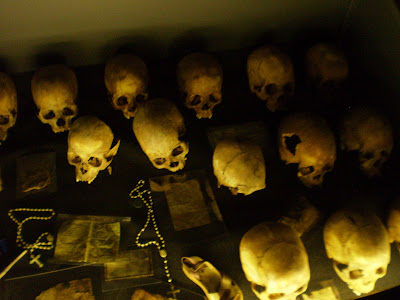

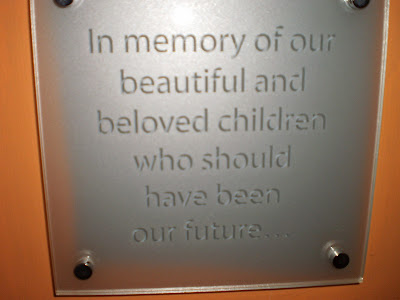








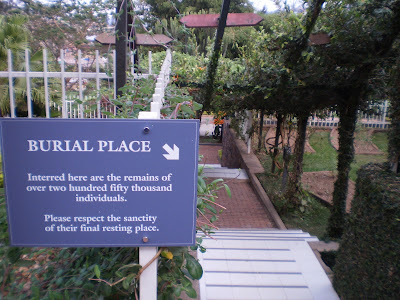



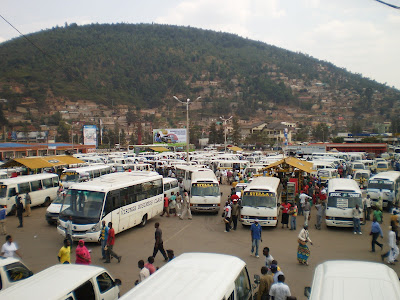













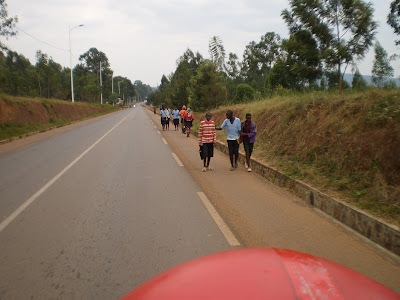














No comments:
Post a Comment